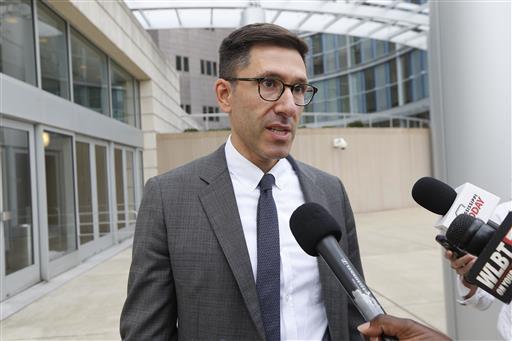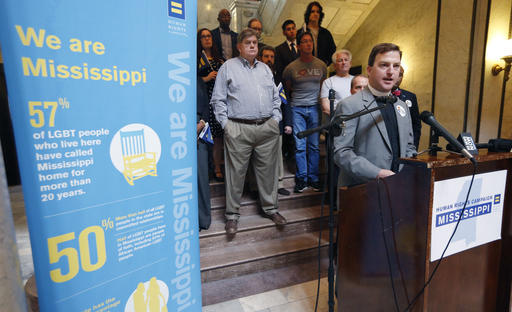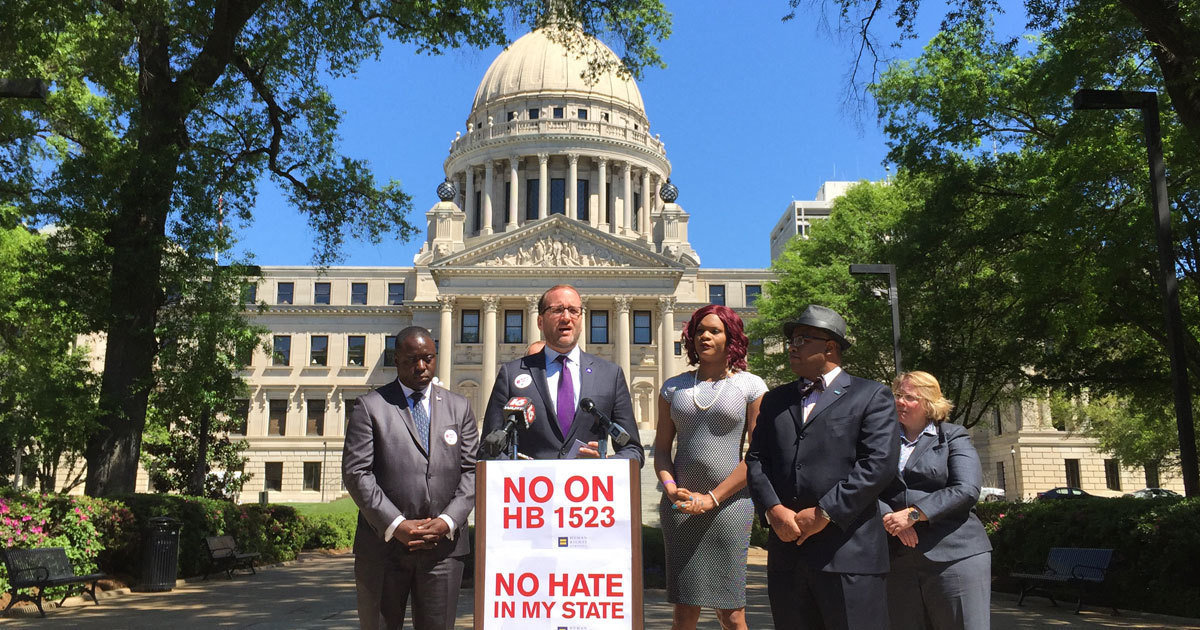

JACKSON, Mississippi (AP) — Attorneys trying to block a Mississippi law dealing with religious objections to same-sex marriage argued Friday that it unconstitutionally establishes state-preferred beliefs and treats lesbian, gay, bisexual and transgender people different from other citizens.
State attorneys defending House Bill 1523 argued that it simply protects government employees, business people and others who believe marriage should only be between a woman and a man.
The bill was filed in response to last summer’s U.S. Supreme Court ruling that legalized same-sex marriage nationwide.
U.S. District Judge Carlton Reeves on Friday finished hearing three days of arguments over three lawsuits that asking him to block the bill from becoming law next Thursday.
Reeves asked dozens of questions of attorneys on both sides, focusing on how the law would affect the lives of LGBT people and whether any same-sex marriage opponents have been prohibited from exercising their religion since the marriages became legal.
The judge also asked whether legislators would try other approaches to satisfy gay-marriage opponents if House Bill 1523 is blocked: “What would prevent the state of Mississippi from doing what I call the whack-a-mole theory?”
Reeves overturned Mississippi’s ban on gay marriage in 2014 and put his ruling on hold while the state asked an appeals court to reverse it. While the appeal was pending, the U.S. Supreme Court handed down its marriage ruling in an Ohio case.
Reeves on Friday did not say when or how he will rule on the challenges to the religious-objections law. Attorneys have said that no matter what he decides, they would expect the losing side to appeal.
The law, signed by Republican Gov. Phil Bryant, would protect three beliefs: That marriage should only be between a man and a woman, that sex should only take place within such a marriage and that a person’s gender is set at birth. It would allow clerks to cite those beliefs to recuse themselves from issuing marriage licenses to gay or lesbian couples. It also could affect adoptions and foster care, counseling services, business practices and school bathroom policies.
Roberta Kaplan filed the lawsuit that overturned Mississippi’s gay marriage ban, and she’s one of the attorneys trying to block the religious-objections law. She told Reeves Friday that it “draws lines that affect people’s status in the community.” She also said it’s a clear violation of First Amendment prohibition on government establishing a preferred set of religious beliefs.
“No state before has had the chutzpah to say there are the only these three religious beliefs” that would be protected, said Kaplan, representing Campaign for Southern Equality and a lesbian couple.
Paul Barnes, a special assistant attorney general, described how people who hold those three beliefs felt after the Supreme Court’s same-sex marriage ruling.
“They felt denigrated,” Barnes said. “They felt disfavor.”
Reeves asked Barnes whether the law would protect the sincerely held beliefs of someone who opposes opposite-sex marriage. Barnes paused for several seconds and looked through papers.
“I’d say no,” Barnes finally said, based on the text of the bill. He added that he had “not fully analyzed” the matter.
Rob McDuff is an attorney representing a diverse group of gay and straight plaintiffs in a suit filed by the Mississippi Center for Justice. He said religious-objections law violates the Constitution’s equal-protection guarantee, is “silly and unreasonable” and is a solution in search of a nonexistent problem.
“There’s no evidence of a spiritual crisis in Mississippi because people are getting married,” McDuff said.




Be the first to comment